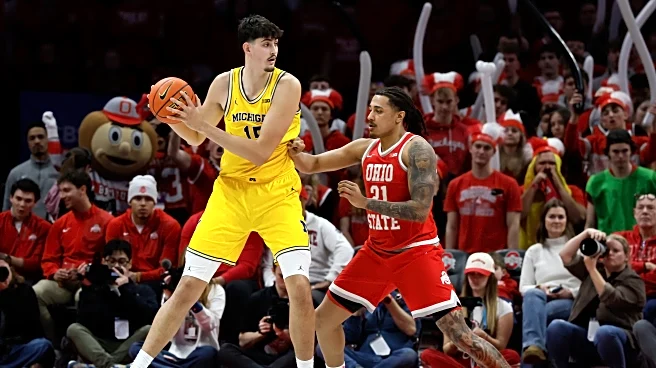What's Happening?
Cleveland Browns rookie quarterback Shedeur Sanders has responded to criticism following his playful trolling of ESPN analyst Rex Ryan during a media session. Sanders mimicked silent answers to reporters' questions after Ryan criticized him for comments made about his readiness to play despite being the third-string quarterback. Sanders expressed that not everyone appreciates his playful demeanor and acknowledged the need to adjust his personality in public settings. He emphasized a focus on positivity and declined to engage in negative discourse. The Browns recently traded veteran quarterback Joe Flacco, leaving Sanders' position as backup quarterback uncertain, with head coach Kevin Stefanski yet to decide between Sanders and practice squad quarterback Bailey Zappe for the upcoming game against the Pittsburgh Steelers.
Why It's Important?
The incident highlights the challenges faced by young athletes in managing public perception and media interactions. Sanders' response underscores the importance of maintaining professionalism and positivity in the face of criticism. The uncertainty surrounding the Browns' quarterback lineup could impact team dynamics and performance, especially with the recent trade of Joe Flacco. Sanders' ability to navigate media scrutiny and his potential elevation to a more prominent role could influence his career trajectory and the Browns' season outcomes. The situation also reflects broader themes in sports regarding athlete conduct and media relations.
What's Next?
The Browns' head coach Kevin Stefanski will make a decision on the backup quarterback position for the upcoming game against the Pittsburgh Steelers. Sanders' role and performance in the team will be closely watched, especially if he is elevated to a more significant position. The team's strategy and lineup decisions could affect their performance in the upcoming games, and Sanders' handling of media interactions may continue to be a point of interest.
Beyond the Headlines
The incident raises questions about the expectations placed on athletes to balance personal expression with professional conduct. It also highlights the role of media in shaping public perception and the pressures athletes face in maintaining a positive image. Sanders' approach to criticism and his focus on positivity may serve as a model for other athletes navigating similar challenges.










